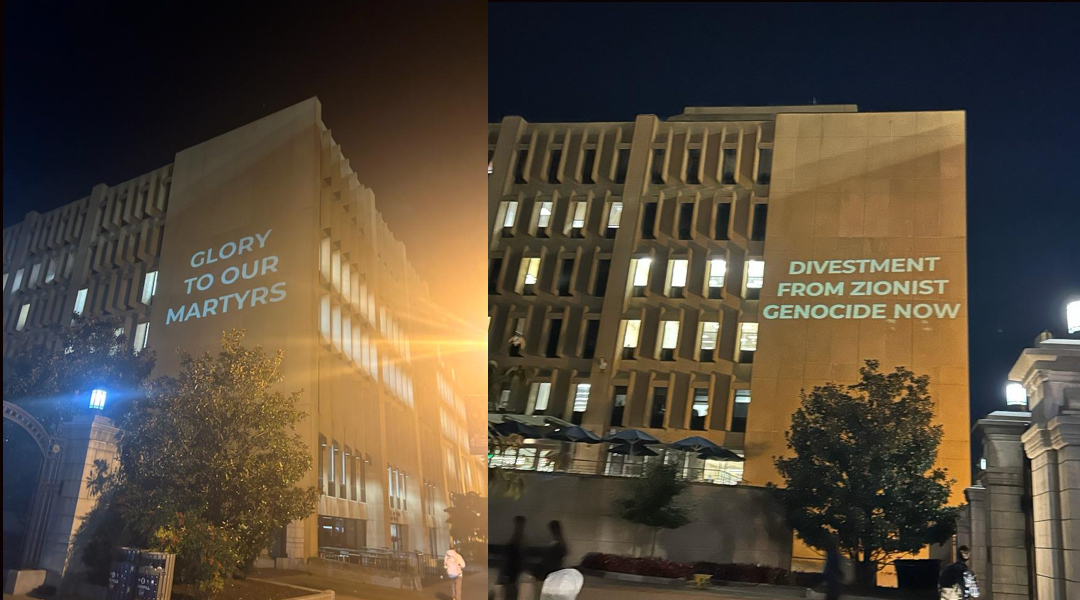(JTA) – Students, administrators and the Hillel director at George Washington University say they are concerned after anti-Israel messages were projected onto the exterior of a campus building on Tuesday night.
The messages — including “Glory To Our Martyrs,” “Divestment From Zionist Genocide Now,” and “Free Palestine From The River To The Sea” — appeared on the side of a library building for two hours, drawing a crowd of counter-protesters to an adjacent plaza where some sang the Hebrew song “Oseh Shalom,” a passage from daily prayers calling for peace.
The display comes at a moment of rising tensions on college campuses following a major attack by the Palestinian terror group Hamas against Israel on Oct. 7 and Israel’s ensuing war in Gaza, which Hamas controls.
Photos shared by the student newspaper and the watchdog group StopAntisemitism showed that the messages spanned several floors and could be read clearly at a distance. Video appeared to show masked students projecting the images from the street, arguing with university police over whether their actions were in violation of campus rules, before being ticketed.
The campus newspaper, GW Hatchet, reported that four student demonstrators associated with Students for Justice in Palestine were responsible for the display. Other phrases that were projected, according to the newspaper: “End the siege on Gaza,” “GW the blood of Palestine is on your hands,” “GW is complicit in genocide in Gaza,” “Your tuition is funding genocide in Gaza,” “2,000 Palestinian children were murdered by ‘Israel’ in the last two weeks” (with “Israel” in quotation marks) and “President Granberg is complicit in genocide in Gaza.”
The last refers to GWU president Ellen Granberg, who joined the university this summer and has published two statements about the war, including one condemning “the celebration of terrorism” that followed a different SJP demonstration.
GW Hillel director Adena Kirstein, who is hosting a survivor of the Hamas-led massacre from an Israeli music festival on campus next week, told the Jewish Telegraphic Agency the phrases broadcast on the library were “absolutely” antisemitic.
“‘From the river to the sea,’ when you call for the erasure of the Jewish space, yes,” she said. “When you put ‘Israel’ in quotation marks, deeply troubling. And by the way, it’s not helping the cause.”
Jewish students on campus, Kirstein said, are “navigating a really, really difficult climate and they feel really isolated and alone.”
In a statement Wednesday, the university acknowledged the projections, which it said were “unauthorized” and “violated university policy.”
“The statements made by these individuals in no way reflect the views of the university,” the statement said, adding, “We recognize the distress, hurt, and pain this has caused for many members of our community.” It also promised further communication from Granberg.
Granberg’s most recent statement about Israel, published Oct. 11, specifically condemned “the celebration of terrorism and attempts to perpetuate rhetoric or imagery that glorifies acts of violence” and came after SJP students reportedly harassed a pro-Israel vigil for the victims of Hamas attacks and published an Instagram statement praising Hamas for “breaking free, tearing down the prison walls, and making it known to the world: We will be caged no longer.” The statement also noted that the SJP chapter does not distinguish between combatants and civilians on either side of the Israeli-Palestinian divide.
College campuses across the country have struggled with how to respond to the Israel-Hamas war. Student groups and faculty at prominent universities have come under fire for statements and comments almost entirely blaming Israel for Hamas’ attacks, or even supporting the attacks themselves. University donors have also pulled support from schools including Harvard over administrators’ perceived reluctance to take a pro-Israel stance on the conflict. Even the student government at Brandeis University, which was founded after the Holocaust by the American Jewish community, this week voted down a resolution to condemn Hamas.
The GWU building where the messages were projected, the Gelman Library on the Washington, DC campus, is named after prominent Jewish philanthropists Melvin and Estelle Gelman, the former of whom endowed a chair of Judaic studies at the university. (It was also the same building where Israeli-American sociologist Amitai Etzioni, an influential proponent of “communitarianism” who died earlier this year, kept an office.)
GWU has played host to a series of antisemitism-related controversies in recent years, including when a Jewish fraternity’s miniature Torah was damaged and a bench at the campus Hillel was vandalized. Earlier this year, the U.S. Department of Education opened a federal civil rights investigation into the university’s handling of complaints directed at a psychology professor over comments she had reportedly directed at Israeli students; the university’s own investigation of the matter determined she had not done anything antisemitic.
Kirstein told JTA that “the university gets a bad rap most of the time” when it comes to Jewish life. Except for the past two weeks, she said, “it’s a vibrant Jewish community. We have a beautiful building, we have kosher food, we have great support from the university.”
Minutes before the messages, Kirstein had posted on her blog about feeling “extra lonely” as “a Jew on a college campus” amid the Israel-Hamas war.
“I am angry — at a world where it seems critical thinking is in short supply,” Kirstein wrote. “I am scared – that some days, my heart is hardening. I am bitter – that my students have to constantly qualify their opinions, proving to others that their souls are always in the right place. I am sad – for what the future might hold.”
JTA has documented Jewish history in real-time for over a century. Keep our journalism strong by joining us in supporting independent, award-winning reporting.






